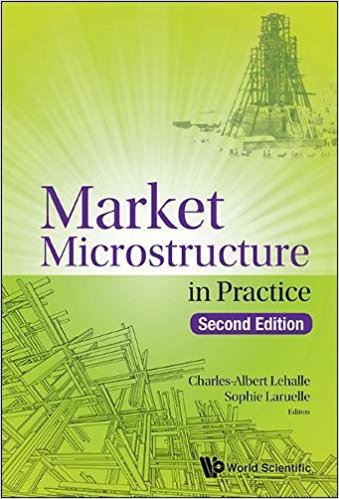Publications
This is home for my research publications, with details when you click.
my Google Scholar Page
My main research topics are Market (Micro)Structure and Liquidity, Statistical Learning and Artificial Intelligence, Optimal Control, and Alternative Data.
Market Microstructure in Practice (2nd Edition)

Financial Markets in Practice:
From Post-Crisis Intermediation to FinTechs

Machine Learning and Data Sciences for Financial Markets

Selected Bibliography
Books and Chapters
- Lehalle, C.-A. and Raboun, A. (2022). Financial Markets in Practice, From Post-Crisis Intermediation to FinTechs - World Scientific publishing.
- Capponi, A. and Lehalle, C.-A. – Editors (2022). Machine Learning and Data Sciences for financial markets: A Guide to Contemporary Practices - Cambridge University Press.
- Lehalle, C.-A. and Laruelle, S. (2013, 2nd Edition 2018). Market Microstructure in Practice - World Scientific publishing.
- Abergel, F., Bouchaud, J.-P., Foucault, T., Lehalle, C.-A., and Rosenbaum, M., Editors (2012). Market Microstructure Confronting Many Viewpoints - Wiley.
- Charles-Albert Lehalle. Market microstructure knowledge needed for controlling an intra-day trading process. In Jean-Pierre Fouque and Joseph~A Langsam, editors, Handbook on systemic risk. Cambridge University Press, 2013.
Selected Papers and Talks (2024 and earlier)
- Li, M. and Lehalle, C.A., 2024. “Mathematics of Embeddings: Spillover of Polarities over Financial Texts”. Reviews In Modern Quantitative Finance, pp.151-188.
- Mounjid, Othmane, and Charles‐Albert Lehalle. “Improving reinforcement learning algorithms: Towards optimal learning rate policies” Mathematical Finance 34, no. 2 (2024): 588-621.
- Leal, Laura, Mathieu Laurière, and C-A. Lehalle. “Learning a functional control for high-frequency finance.” Quantitative Finance 22, no. 11 (2022): 1973-1987.
- Guo, Xin, Charles-Albert Lehalle, and Renyuan Xu. “Transaction cost analytics for corporate bonds.” Quantitative Finance 22, no. 7 (2022): 1295-1319.
- Lehalle, Charles-Albert, Othmane Mounjid, and Mathieu Rosenbaum. “Optimal liquidity-based trading tactics.” Stochastic Systems 11, no. 4 (2021): 368-390.
- Lehalle, Charles-Albert, and Guillaume Simon. “Portfolio selection with active strategies: how long only constraints shape convictions.” Journal of Asset Management 22, no. 6 (2021): 443-463.
- Briere, Marie, Charles‐Albert Lehalle, Tamara Nefedova, and Amine Raboun. “Modeling transaction costs when trades may be crowded: A bayesian network using partially observable orders imbalance.” Machine Learning for Asset Management: New Developments and Financial Applications (2020): 387-430.
- Briere, Marie, Charles‐Albert Lehalle, Tamara Nefedova, and Amine Raboun. “Stock market liquidity and the trading costs of asset pricing anomalies.” Université Paris-Dauphine Research Paper 3380239 (2019).
- Cardaliaguet, Pierre, and Charles-Albert Lehalle. “Mean field game of controls and an application to trade crowding.” Mathematics and Financial Economics 12 (2018): 335-363.
- Megarbane, Nicolas, Pamela Saliba, Charles-Albert Lehalle, and Mathieu Rosenbaum. “The behavior of high-frequency traders under different market stress scenarios.” Market Microstructure and Liquidity 3, no. 03n04 (2017):
- Geeraert, Sébastien, Charles-Albert Lehalle, Barak A. Pearlmutter, Olivier Pironneau, and Adil Reghai. “Mini-symposium on automatic differentiation and its applications in the financial industry.” ESAIM: Proceedings and Surveys 59 (2017): 56-75
- Lachapelle, A., Lasry, J.-M., Lehalle, C.-A., and Lions, P.-L. (2016), Efficiency of the Price Formation Process in Presence of High Frequency Participants: a Mean Field Game analysis, Mathematics and Financial Economics, 10(3):223–262.
- Huang, Weibing, Charles-Albert Lehalle, and Mathieu Rosenbaum. “How to predict the consequences of a tick value change? Evidence from the Tokyo Stock Exchange pilot program.” Market Microstructure and Liquidity 2, no. 03n04 (2016)
- Guéant, O. and Lehalle, C.-A. (2015). General intensity shapes in optimal liquidation, Mathematical Finance, 25(3):457–495.
- Huang, W., Lehalle, C.-A., and Rosenbaum, M. (2015), Simulating and analyzing order book data: The queue-reactive model, Journal of the American Statistical Association, 10(509).
- Huang, Weibing, Charles-Albert Lehalle, and Mathieu Rosenbaum. “Simulating and analyzing order book data: The queue-reactive model.” Journal of the American Statistical Association 110, no. 509 (2015): 107-122.
- Lehalle, C.-A. (2015), Mathematical Models to Study and Control the Price Formation Process, Habilitation à Diriger les Recherches - Université Pierre et Marie Curie (Paris VI)
- Bacry, E., Iuga, A., Lasnier, M., and Lehalle, C.-A. (2015), Market Impacts and the Life Cycle of Investors Orders, Market Microstructure and Liquidity, 1(2).
- Azencott, R., Beri, A., Gadhyan, Y., Joseph, N., Lehalle, C.-A., and Rowley, M. (2014), Realtime market microstructure analysis: online Transaction Cost Analysis, Quantitative Finance, pages 0–19.
- Laruelle, S., Lehalle, C.-A., and Pagès, G. (2013), Optimal posting price of limit orders: learning by trading, Mathematics and Financial Economics, 7(3):359–403.
- Guéant, O., Lehalle, C.-A., and Fernandez-Tapia, J. (2012), Optimal Portfolio Liquidation with Limit Orders, SIAM Journal on Financial Mathematics, 13(1):740–764.
- Pagès, G., Laruelle, S., and Lehalle, C.-A. (2011), Optimal split of orders across liquidity pools: a stochastic algorithm approach, SIAM Journal on Financial Mathematics, 2:1042–1076.
- Bouchard, B., Dang, N.-M., and Lehalle, C.-A. (2011), Optimal control of trading algorithms: a general impulse control approach, SIAM J. Financial Mathematics, 2(1):404–438.
- Braouezec, Y. and Lehalle, C.-A. (2010), Corporate Liquidity, Dividend Policy and Default Risk: Optimal Financial Policy and Agency Costs, International Journal of Theoretical and Applied Finance, 13(4).
- Lehalle, C.-A. and Azencott, R. (2004b), On the fly health monitoring of mechanical hazards from under sampled signals in formula one, FISITA World Automotive Congress.
Detailed publications and talks (2024-)
Optimal Maritime Transport through Mean Field Games and inference of its parameters
Maritime traffic
Mean Field Games
Price Formation
alternative Data
How Confrontation Of Information And Flows Shapes Prices
Financial Markets
Price Formation
alternative Data
Synthetic Data for Portfolios: A Throw of the Dice Will Never Abolish Chance
GenAI
Time series
Portfolio construction
Machine Learning
Mathematics of Embeddings: Spillover of Polarities over Financial Texts
Alternative data
Embeddings
Machine Learning
Improving reinforcement learning algorithms: Towards optimal learning rate policies
Reinforcement Learning
Machine Learning
Market Microstructure
Optimal Trading
No matching items